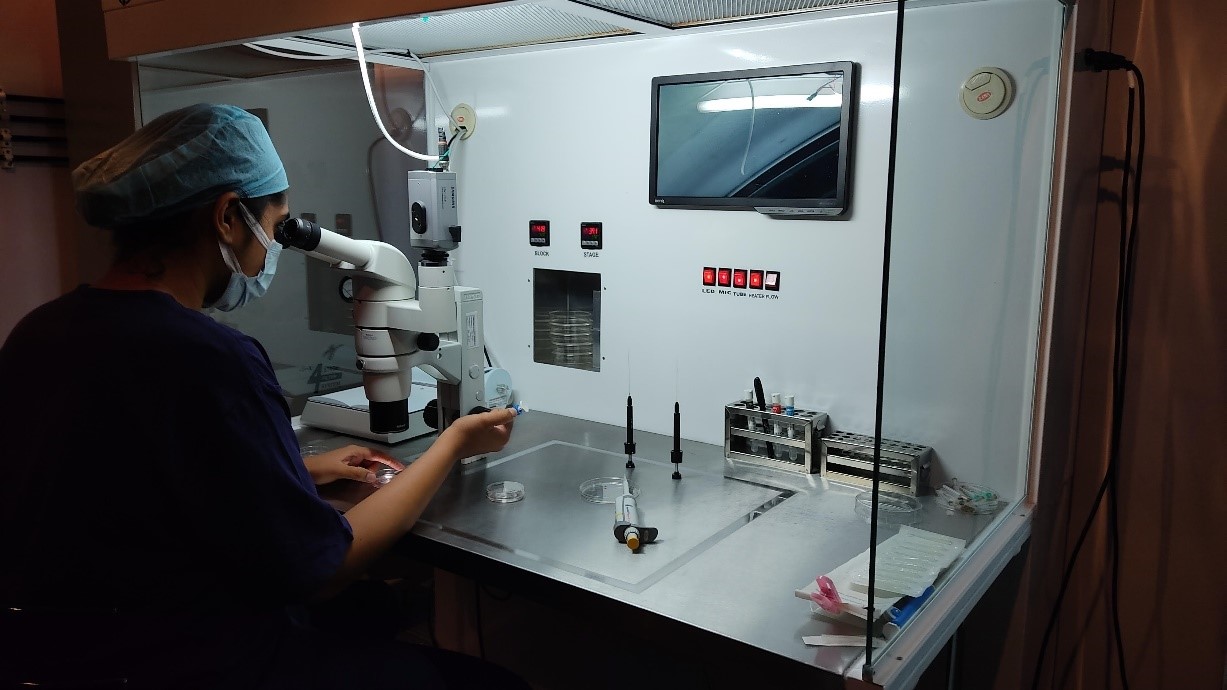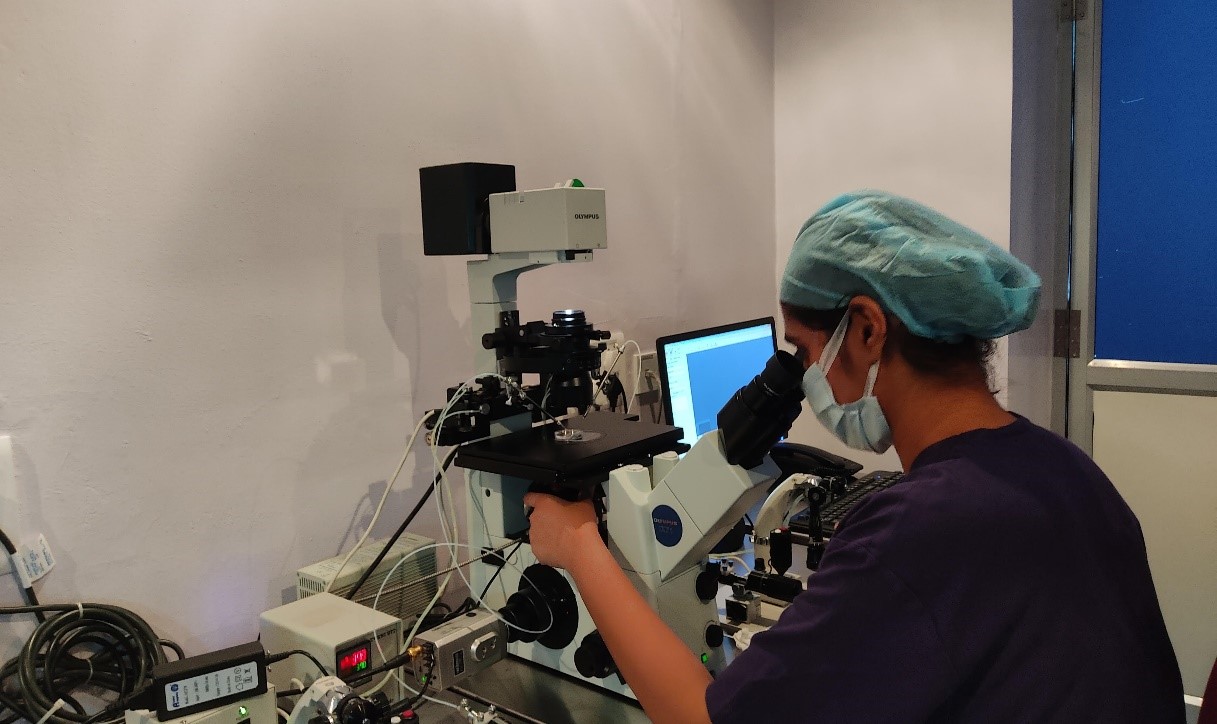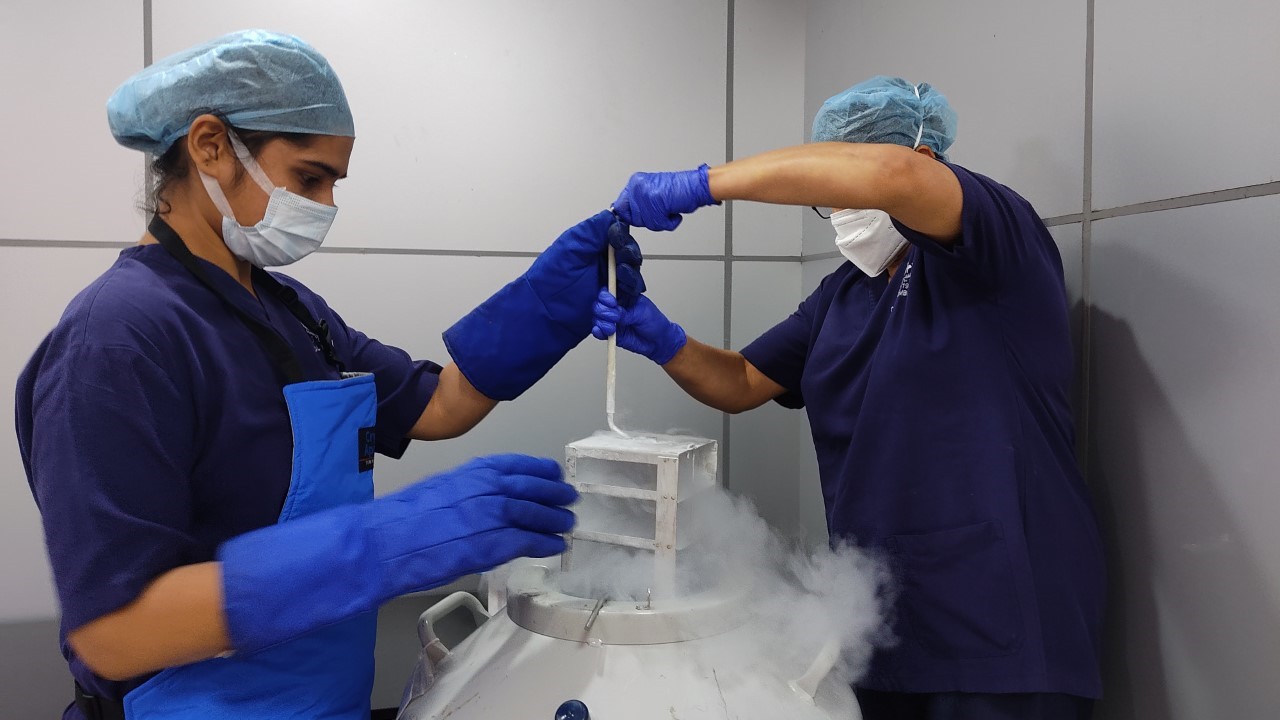About the Department
The Department of Reproductive Science (formerly known as Department of Clinical Embryology), is at the forefront of reproductive health and research, committed to advancing knowledge, providing comprehensive education, and offering top-tier clinical services in reproductive science and medicine. Our mission is to improve reproductive health outcomes through conducting innovative research, providing exceptional education, and compassionate patient care. The department is headed by Dr Satish Adiga, which is organized into three divisions with focused research and academic goals.
· Centre of Excellence in Clinical Embryology
· Division of Reproductive Biology
· Division of Reproductive Genetics
The three divisions are staffed with highly qualified, experienced faculties, adjunct faculties, and researchers dedicated to advancing knowledge, fostering innovation, and making significant contributions to their respective fields.
Mission
Innovative Research: Conducting cutting-edge research to understand reproductive health and disease.
Comprehensive Education: Training the next generation of leaders in reproductive science and medicine.
Compassionate Care: Providing exceptional embryology services to couples seeking infertility treatment, providing state-of-the-art onco-fertility service.
Vision
Interdisciplinary collaboration: To foster a collaborative environment that encourages interdisciplinary partnerships within the university and with other leading institutions globally, promoting the exchange of knowledge and enhancing research outcomes
Community outreach programs: To actively engage with the community through educational outreach, public health initiatives, and advocacy, raising awareness about reproductive health issues and providing resources to support individuals and families.
Research Focus:
Our research aims to unravel the complexities of reproductive biology, from deciphering the molecular mechanisms underlying infertility to exploring innovative treatments. We focus on understanding the pathophysiology of various reproductive disorders, such as PCOS and endometriosis, and diabetes mellitus using specific disease models to develop novel biomarkers and newer therapeutic strategies. Our research team is engaged in a wide range of topics, including reproductive toxicity assessment, and enhancement of reproductive outcomes in both natural and assisted conception, by investigating the potential of natural products, phytomedicines, micronutrients, and small molecules.
Academic Programs:
We are dedicated to educating and shaping the next generation of scientists and healthcare professionals in the field of reproductive science through our M.Sc. and Ph.D. programs. Our robust curriculum and comprehensive training programs provide students and research scholars with exceptional opportunities to interact with academic stalwarts and industry leaders. This environment fosters hands-on experience and deep theoretical knowledge, equipping students to excel in their careers and make significant contributions to the field.
Projects
SI No. |
Project |
Principal Investigator |
Agency |
Duration |
1 |
Identifying and exploring the key deubiquitinase enzyme that facilitates the generation of |
Dr. Guruprasad Kalthur |
ICMR |
2024-2026 |
2 |
Exploring the therapeutic potential of metformin and acarbose coadministration strategy on improving the functional competence of oocyte, embryo development and fetal development in experimentally induced PCOS and type II diabetes |
Dr. Guruprasad Kalthur |
ICMR |
2024-2026 |
3 |
Artificial Intelligence augmented oocyte retrieval for improved outcome of Assisted Reproductive Technologies (AI4ART) |
Dr. Rahul Dutta |
AI4ICPS-DST |
2024-2026 |
4 |
Elucidating the cryo-susceptibility and mitochondrial dynamics of oocytes and embryos under maternal metabolic conditions |
Dr. Sandhya Kumari MV |
ICMR |
2023-2026 |
5 |
Understanding the role of fibroblast-specific protein-1 (S100A4) in profibrotic and inflammatory pathways as a possible therapeutic target in managing endometriosis-associated fibrosis |
Dr. Rahul Dutta |
ICMR |
2023-2026 |
6 |
Elucidating the influence of the GLP-1 agonist liraglutide on oocyte functional competence and the gamete function in progenies of mice with maternal obesity – an experimental study |
Dr. Sandhya Kumari MV |
MAHE-IMF |
2023-2026 |
7 |
Long-term effects of repeated ovulation induction-induced changes in hormone sensitive organs- an experimental study |
Dr. Guruprasad Kalthur |
DBT |
2023-2026 |
8 |
Unravelling the influence of genetic variants on follicular microenvironment, ovarian response and pregnancy outcome in young women undergoing assisted reproductive technology (ART) treatment |
Dr. Shubhashree Uppangala |
SERB |
2023-2026 |
9 |
Uncovering novel monogenic causes for female infertility disorder |
Dr. Aditi Gupta |
MAHE-IMF |
2023-2026 |
10 |
Investigation of microplastics in waterbodies and its detrimental impacts on reproductive functions using mice models probed by Micro-Raman Spectroscopy |
Dr. Guruprasad Kalthur |
MAHE-IMF |
2023-2025 |
11 |
Impact of oxygen tension on embryo development in mice with diminished ovarian reserve |
Dr. Satish Kumar Adiga |
UGC |
2022-Ongoing |
12 |
Proapoptotic peptide-mediated targeted depletion of Endometriosis Associated M2 macrophage population: An alternative strategy for endometriosis management. |
Dr. Rahul Dutta |
ICMR |
2022-2025 |
13 |
Validation of bioreactor in improving ovarian tissue viability and quality |
Dr. Satish Kumar Adiga |
SAR Healthline |
2023-2024 |
14 |
Understanding the clomiphene citrate-induced changes in secretory epithelial cells of human fallopian tube |
Dr. Guruprasad Kalthur |
ICMR |
2021-2024 |
15 |
Experimental approach to assess the protective effects of Gonadotropin releasing hormone agonist (GnRHa) in preventing the chemotherapy induced ovarian damage and transgenerational effects |
Dr. Shubhashree Uppangala |
ICMR |
2021-2024 |
16 |
Merck Foundation Capacity Building |
Dr. Satish Kumar Adiga |
Merck Foundation Germany |
2018-Ongoing |
17 |
Advanced Skill Set Embryology Training (Asset), Education Grant |
Dr. Satish Kumar Adiga |
Merck Specialities Pvt. Ltd. Mumbai |
2015-Ongoing |
Collaborations
Academia |
|
International |
National |
University of Munster, Germany |
Indian Institute of Science (IISc), Bengaluru |
University of Naples, Italy |
National Centre for Biological Sciences (NCBS), Bengaluru |
UKC Maribor, Slovenia |
Institute of Bioinformatics and Applied Biotechnology (IBAB), Bengaluru |
Karolinska University Hospital, Sweden |
St. John’s Research Institute, Bengaluru |
Mayo Clinic, United States of America |
Centre for DNA Fingerprinting and Diagnostics (CDFD), Hyderabad |
University Hospital Heidelberg, Germany |
Centre for Cellular & Molecular Biology (CCMB), Hyderabad |
University of Peradeniya, Sri Lanka |
Indian Institute of Technology (IIT), Hyderabad |
New York University, United Arab Emirates |
Advanced Centre for Treatment, Research and Education in Cancer (ACTREC), Mumbai |
King Khalid University, Kingdom of Saudi Arabia |
ICMR- National Institute for Research in Reproductive and Child Health (NIRRCH), Mumbai |
|
CSIR-Indian Institute of Toxicology Research, Lucknow |
|
National Institute of Technology (NIT), Calicut |
|
Yenepoya (Deemed to be University), Mangaluru |
|
Shri Dhramasthala Manjunatheshwara (SDM) College of Medical Sciences and Hospital, Dharwad |
|
|
Industry |
|
Kamineni Life Sciences Private Limited, Hyderabad |
|
Origin Diagnostics and Research, Kollam |
|
SAR Healthline, Chennai |
|
Anderson Diagnostics and Labs, Chennai |
|
Ph.D Awarded/Ongoing
Name |
Year of award |
Dr. Dinesh Upadhya |
2010 |
Dr. Varshini Jayaraman |
2012 |
Dr. Dayanidhi Kumar |
2016 |
Dr. Shubhashree Uppangala |
2018 |
Dr. Fiona Dsouza |
2018 |
Dr. Ramya Nair |
2019 |
Dr. Sachin Honguntikar |
2020 |
Dr. Guruprasad Nayak |
2021 |
Dr. Sandhya Kumari MV |
2021 |
Dr. Arpitha N Rao |
2022 |
Dr. Aswathi C |
2023 |
Dr. Daphne Norma Crasta |
2023 |
Dr. Huidrom Yaiphaba Meitei |
2023 |
Dr. Pooja SP |
2023 |
Dr. Prathima Tholeti |
2024 |
Dr. Ameya Jijo |
2024 |
Dr. Riddhi Pandya |
2024 |
Dr. Akshatha DP |
2024 |
Dr. Dhakshanya P |
2024 |
Dr. Reyon Dcunha |
2025 |
Ms. Keerthana Poojary |
Ongoing |
Ms. Divya Bhagat |
Ongoing |
Ms. Jyolsna PK |
Ongoing |
Mr. Sujith Raj Salian |
Ongoing |
Ms. Vanishree VM |
Ongoing |
Ms. Amrutha NK |
Ongoing |
Ms. Alvita Sanjana |
Ongoing |
Ms. Opalina Roy |
Ongoing |
Ms. Shobitha Padmar |
Ongoing |
Ms. Megha Anchan |
Ongoing |
Ms. Shruthivishali M |
Ongoing |
Mr. Yashas Ninjoor |
Ongoing |
Ms. Mouna B.K |
Ongoing |
Ms. Shravya Shetty |
Ongoing |
Ms. Zahara Fathima Khan |
Ongoing |
Ms. Samruddhi Prasad Deshpande |
Ongoing |
Mr. Atharvaraj Abhay Hande |
Ongoing |
Ms. Sharal Alva |
Ongoing |
Ms. Liya E. Joshy |
Ongoing |
Services offered
Manipal Assisted Reproduction Centre (MARC) is the clinical wing of the department which treats approximately ten thousand infertile patients every year. The department of clinical embryology provides clinical service in the following areas:
Andrology laboratory:
The Andrology specialized laboratory offers a wide range of diagnostic and therapeutic techniques to meet patient needs. The laboratory uses the latest World Health Organization (WHO, Fifth Edition, 2010) guidelines and reference ranges in the evaluation of semen samples. Other facilities such as computer assisted semen analysis (CASA), sperm DNA fragmentation test, advanced sperm preparation methods for therapeutic insemination, semen and testicular tissue cryopreservation are also available to cater infertility patients.


In vitro Fertilization (IVF) laboratory:
The IVF Lab at Manipal Assisted Reproduction Centre (MARC) is key to our mission to help patients through the journey of becoming parents. For those struggling to conceive, the advanced technologies and workstations help to evaluate their sperm and eggs, use appropriate methods to fertilize and develop the embryos before they are implanted into the uterus. The IVF lab has one of the most experienced teams in the field of IVF. Many on our team have decades of experience. Embryologists in the team have special training in several niche areas of IVF which is beyond the national requirements.
Fertility Preservation (Oncofertility):
Cancer treating drugs and radiation often damage eggs and sperm producing cells in the body which are necessary for successful pregnancy. In men, the side effects of cancer treatment can cause damage to the testes and interfere with sperm production. Similarly, damage to eggs can compromise a woman’s childbearing ability in the future. There is thus an urgent need to protect the fertility of such patients before cancer treatment can commence.
The Centre for Fertility Preservation has advanced technologies and cryogenic facilities to freeze gametes and embryos for those who have procedures that may make them unable to have children, including cancer patients. First of its kind in the country, the centre along with its partners Oncofertility Consortium in USA and University of Muenster in Germany, offers fertility preservation services to cancer affected children and young adults.

Faculty
Contact us
Address
Google Map: https://goo.gl/maps/nc7awwnqUCaXmXKh8
Email: reproduction@manipal.edu
Phone Number: +91 (0)820-292-3242




